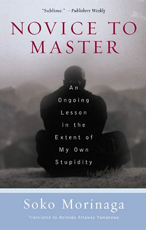Soko Morinaga (1925 - 1995) entered Zen practice after graduating from high school. He was ordained as a monk by Zuigan Goto in l948 and trained at the monastery at Daitokuji from l949 to l963. Soko Morinaga received the seal of the Dharma transmission from Sesso Ota Roshi. He went on to serve as the head of Hanazono University in Kyoto, the primary training university of the Rinzai sect.
"The purpose of practice," writes Morinaga, "is not to increase knowledge but to scrape the scales off the eyes, to pull the plugs out of the ears. Through practice one comes to see reality. And although it is said that 'no medicine can cure fully,' whatever prompts me to realize 'I was a fool' is, in fact, just such a medicine."
While training as a monk in a Zen monastery, the author was brought again and again to a close encounter with what he calls his idiocy — misconceptions generated by his attachment to a narrow experience of knowledge. With a fine sense of humor and commendable patience, Morinaga endures the rigors of sleepiness, a constant empty stomach, no sounds at meals in the dining hall, and the strictness of the master.
The author repeatedly has to firm up his resolve and solidify his intention to keep up his practice while constantly being dogged by his feelings of superiority and inferiority. In Zen practice it is necessary to break the ego — there is no way around it.
In the first sermon he heard from his Zen teacher, Morinaga learned: "In people or things, there is no such thing as trash." This combination memoir and wisdom resource, translated by Belenda Attaway Yamakawa, provides a lively and enlightening overview of Zen. There are several wonderful anecdotes on the poignance of living in the present moment or what Morinaga calls melting within the activity you are experiencing with a state of mind that makes absolutely no projections of favorability or adversity.
